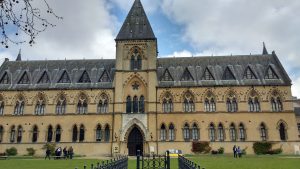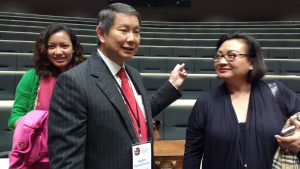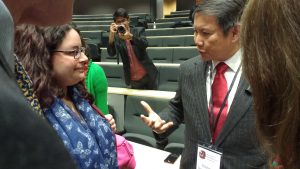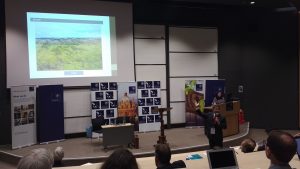 My entire time at the Southeast Asian Studies Symposium was intellectually enlightening, and I attended a number of talks by fantastic speakers. However, Hashim’s keynote left the deepest impression on me as it spoke about a sustainable future as an actual possibility. It is unlikely to hear any positivity when discussing climate change, as the general consensus seems to be that whatever actions undertaken are too little, too late, and that the damage is irreparable.
My entire time at the Southeast Asian Studies Symposium was intellectually enlightening, and I attended a number of talks by fantastic speakers. However, Hashim’s keynote left the deepest impression on me as it spoke about a sustainable future as an actual possibility. It is unlikely to hear any positivity when discussing climate change, as the general consensus seems to be that whatever actions undertaken are too little, too late, and that the damage is irreparable.
Into this narrative comes Hashim, a ray of hope. In his presentation, he stated that it is now possible to embark upon reforestation, protect wildlife, produce sustainable food, pay a living wage, and make a profit. He ‘put his money where his mouth is’, by divesting his interests in oil, gas and polluting industries and then investing in environmentally friendly initiatives. He spoke of supporting ‘horticulture, not money culture’, but also of an exciting new enterprise of reforesting that can turn a significant profit. By making an environmentally sustainable business-model, other businessmen could be persuaded to act not charitably (or only charitably), but in their own self-interest.
 Hashim reported that it was possible to take destroyed land and restore it to a thriving rainforest ecosystem in a mere twelve years, a fraction of the time previously believed. In the area he worked on in Indonesia, rains returned due to the rainforest increasing moisture levels, wildlife returned, and what had been a barren desert was now a thriving ecosystem. Studies showed that ground-water levels had increased. We now know it can be done, and that it costs a mere $2005 to reforest a hectare with commercially viable trees and plants which turn a healthy profit as well as providing local residents with employment – thereby incentivising them to protect the forest.
Hashim reported that it was possible to take destroyed land and restore it to a thriving rainforest ecosystem in a mere twelve years, a fraction of the time previously believed. In the area he worked on in Indonesia, rains returned due to the rainforest increasing moisture levels, wildlife returned, and what had been a barren desert was now a thriving ecosystem. Studies showed that ground-water levels had increased. We now know it can be done, and that it costs a mere $2005 to reforest a hectare with commercially viable trees and plants which turn a healthy profit as well as providing local residents with employment – thereby incentivising them to protect the forest.
What was previously a barren scrub land, inhabited only by weeds and rats was now a bio-diverse environment. It also provides a profitable alternative to palm oil plantations.
The Palm Sugar Tree (although a plant, not a tree) is a huge part of the commercial viability of rainforest reforestation. It provides a sugary juice that can be used to make low glycemic index sugar as well as ethanol. One hectare produces three times as much sugar as a sugar cane plantation, and the Palm Sugar Tree secretes all year. It’s roots burrow 12 metres into the soil – relocating large amounts of carbon dioxide from the atmosphere. It also stores a great deal of water and restores the area’s water resources.
I was intrigued to hear that the Palm Sugar Tree (PST) grows well only in a bio-diverse environment. Therefore, the best economic plan is to grow PST is as part of a mixed tropical rainforest – promoting a biodiversity that will beneficial for all. I like to think of this as mother nature ‘hitting-back’. Ensuring that if we want to make use of this plant’s special properties, it must be as part of something beneficial to the entire ecosystem, rather than cultivating a PST plantation
 With a predicted five-fold increase in population in Nigeria by 2100, it is a prime candidate for sustainable development – and this kind of reforestation project is ideal. The profitability of the sustainable rainforest is of great benefit to the environment and the economy. Aside from sugar and ethanol, the rainforest can also replace oil use, produce biodegradable plastic, organic fertiliser as well as provide a habitat for endangered species. This organic fertiliser can then be used to enable forestation of vast swathes of the world’s expanding deserts and degraded land without the use of chemical fertilisers!
With a predicted five-fold increase in population in Nigeria by 2100, it is a prime candidate for sustainable development – and this kind of reforestation project is ideal. The profitability of the sustainable rainforest is of great benefit to the environment and the economy. Aside from sugar and ethanol, the rainforest can also replace oil use, produce biodegradable plastic, organic fertiliser as well as provide a habitat for endangered species. This organic fertiliser can then be used to enable forestation of vast swathes of the world’s expanding deserts and degraded land without the use of chemical fertilisers!
‘The world must also be reforested – 1.2 billion hectares to be replanted in the next 40 years for the earth to have a sustainable future’.
Self-interest is the best way to get things done. The level of economic return – 25% as opposed to the 19% return on Palm Oil according to McKinsey – will incentivise business people as it will be in their selfish, self-interest to do the right thing.
With natural forests disappearing at an alarming rate – it is estimated that there will be no forest cover in Indonesia in 25 years – and the implications this has for planetary health as a whole.
Hashim passionately believes that there are exciting future investment opportunities that allow businesses to protect the environment and turnover a healthy profit.
It is inspirational to hear of hope, and to hear from a businessman who terminated his involvement in oil and gas polluting industries for moral reasons, and who is trying to rewrite the narrative on profit and environmental protection, showing that the two are not mutually exclusive.
For more on this topic, listen to this speech, given in Paris, on youtube: https://youtu.be/CMv4vMIntSI
Reviewed by Jodie Satterley

